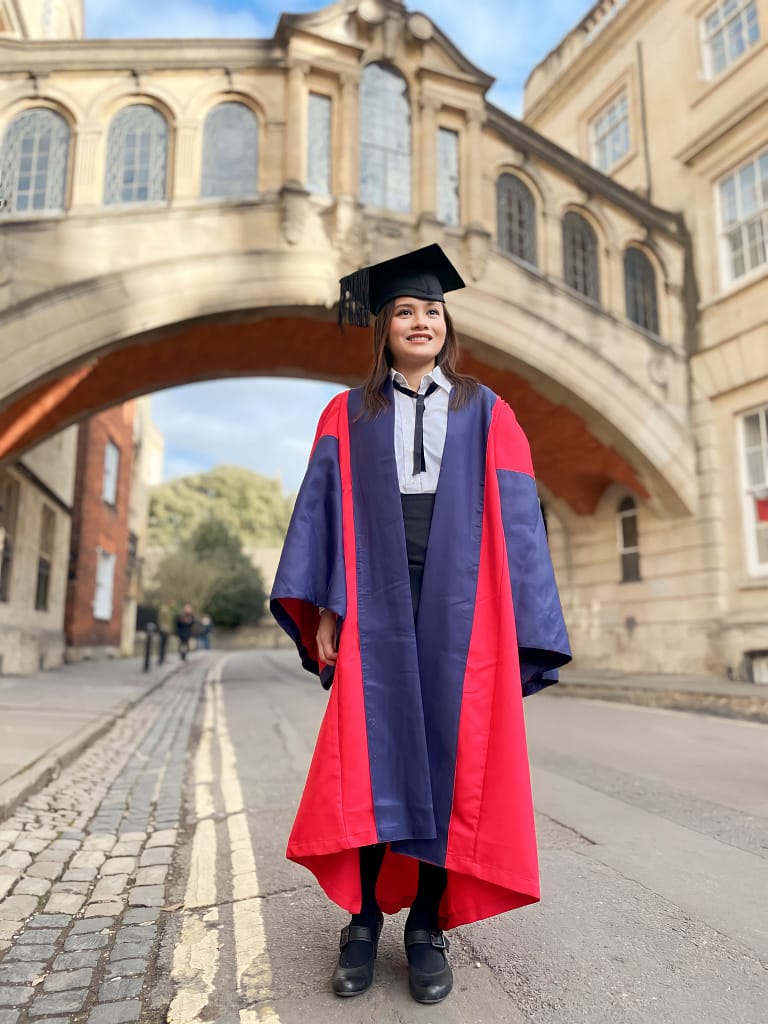My personal thoughts a year after graduating from my DPhil (Doctor of Philosophy) at the University of Oxford.
—
Photo of the Radcliffe Camera from the top of the University Church taken by myself towards the end of my DPhil at the University of Oxford in 2021.
In navigating the intricate realms of pursuing specialisation in Obstetrics & Gynaecology while nurturing academic aspirations, one inevitably encounters the persistent spectre of imposter syndrome. If I were to be harsh, I would say that I am rather disappointed in myself. The arduous balancing act between clinical mastery and scholarly pursuits demands a steadfast resolve. Indeed, the dichotomy between the expectations of clinicians and scientists, each demanding their own measure of dedication, can be formidable. But perhaps, we are viewing my role wrongly. Positioned at the nexus of clinical practice and scientific inquiry, one embodies a synthesis of both realms. Herein lies the essence of my role—one that comprehends the patient’s journey intimately while possessing the acumen to delve into the depths of biological research.
A year after my DPhil graduation, I do not feel any wiser than before. Instead of basking in newfound sagacity, an unsettling notion of diminishing acumen pervades my consciousness, shrouding me in a veil of perceived inadequacy. In plain words, I feel that I have become stupider having gone through the DPhil process: the acquisition of knowledge has seemingly been overshadowed by the sobering realities of academic politics, the relentless pressure of the “publish or perish” ethos, and the formidable obstacle of inadequate funding especially in women’s health. All of which are not unique to Oxford, but permeate throughout all realms of academia.
So, why did I do a DPhil?
Is a DPhil required to be me? What am I trying to be? A medical doctor-scientist-activist?
The notion of pursuing a DPhil never crossed my mind in the wildest of reveries. It emerged gradually, fuelled by the burgeoning passion unearthed during my MSc research endeavours and the enriching collaborations with peers. While I never perceived myself as inherently scholarly, perhaps that self-assessment belied a deeper truth. Though my academic journey was punctuated by periods of perceived inertia, juxtaposed against peers with unwavering career aspirations, I found myself grappling with a profound sense of self-discovery and belonging. Unlike colleagues whose vocational paths seemed predestined, my own trajectory was marked by uncertainty and a relentless quest for identity amidst the sea of expectations. I had first-time passes in medical school, but I was not exactly the top-of-the-year student material. I was struggling emotionally too – trying to fit in everywhere I went but never fit in. I did not know what I wanted to specialise in unlike my neurosurgical colleagues who knew from day 1 of medical school that they wanted to become neurosurgeons. I got to where I am now not because I am smart, but because I am just extremely tenacious.
Through my journey of exploration, experimentation, and engaging with individuals across diverse vocations, a profound insight has crystallised:
Passion is not stumbled upon; it is meticulously cultivated. Click To TweetThe culmination of my present achievements is rooted in a decade-long odyssey, marked by a humble commencement undertaking the most mundane tasks and respecting others for their contributions.
I developed an interest in endometriosis and operating in the same manner. However, embarking on an *Academic Clinical Fellowship (ACF) post DPhil has unveiled a unique set of challenges. While possessing the research autonomy in this role, I find myself navigating a funding landscape that often overlooks my hybrid profile.
*An Academic Clinical Fellowship is a post funded by the National Institute of Health & Research (NIHR), UK which stipulates 75% clinical work and 25% academic work and is designed to give medical doctors research experience. It is not typically awarded to PhD holders, but stiff competition at top UK universities meant that those who applied very often have an MSc or a PhD.

The conventional grant criteria, tailored for either doctoral candidates or seasoned clinicians, pose a conundrum for someone like myself, a postdoctoral researcher and a junior specialty trainee doctor. The typical avenues for funding for clinical academics in the UK favour those in pursuit of doctoral candidacy or those already established in clinical practice, leaving me betwixt and between. To surmount this impasse, innovative strategies become imperative. I am cognisant that securing substantial funding hinges on an ample portfolio of publications. Yet, to augment this portfolio, an abundance of data is requisite, which, paradoxically, demands substantial funding. This cyclic dependency presents a formidable conundrum, akin to a catch-22 scenario. Additionally, the acquisition of clinical proficiency in a surgical specialty such as Obstetrics & Gynaecology necessitates a significant investment of time, often at the expense of academic pursuits. Embarking on biological research in a wet lab also demands considerable time investment, particularly when pursuing new hypotheses. I feel that an ACF arrangement would be better suited for non-surgical medical specialties such as psychiatry, or that I should forget about pursuing biological research. I have been told many times by people around me that I cannot do everything, and I am already doing the best I could. But what if I can do everything? But what if I can do even better?
Some time during my DPhil, coupled with a strong sense of justice, I revisited the practice of FGM/C (female genital mutilation/ cutting) in Malaysia and that gave birth to the Malaysian Doctors for Women & Children (MDWC). I vividly remember contacting Prof Rashid Khan on ResearchGate upon reading his work on the medicalisation of FGM/C in Malaysia. Leveraging platforms like ResearchGate and Instagram, I rallied fellow Malaysian doctors, envisioning a collective effort to address overlooked yet impactful issues affecting Malaysian women.
Though beset by initial challenges and the departure of some due to ideological differences, our nascent team persevered. Beginning with naught but a shared passion and no institutional support, we embarked on our mission. Through sheer enthusiasm and a collaborative ethos, we managed to secure modest funding and garnered international recognition, albeit still in the nascent stages. Details remain confidential for now, but our journey stands as a testament to the power of collective dedication and shared vision. As MDWC flourished, our scope expanded to encompass critical areas such as the gender pain gap, menstrual health, and endometriosis. When I attended the World Congress on Endometriosis last year, I realised the need for more high-quality research from the Global South. But I digress.
Motivated by a dedication to measurable impact, I remain resolute in my pursuit of advancing endometriosis research within my capacity as a clinical academic, undeterred by constraints of time or funding. If this means becoming an activist or an advocate of some sort to wet everyone’s appetite for more funding towards my area of research interest in underserved communities, such as the Southeast Asian population, so be it! Embarking on my DPhil journey unveiled a profound realisation of my intrinsic value—a culmination of acquired knowledge and cultural capital. Beyond the confines of my clinical role, I embrace the boundless possibilities afforded by my enriched experience and skill set. Therefore, if my current role or job no longer satisfies my aims of making a tangible impact in my areas of interests, I may look into different and unconventional ways of solving that problem.
Possessing a DPhil should not tether one solely to academia, just as a medical degree should not restrict one solely to clinical practice. Wicked medical problems require an ensemble of experts from different backgrounds and qualifications, not just those belonging to the medical profession. It is imperative for doctors and clinical academics to transcend conventional networks, fostering genuine connections beyond the confines of tradition. However, not every interaction should be viewed through the lens of networking. Sincere engagement with others proves invaluable in life’s journey.
Related posts:
- My 2023 Top 10 Words of Wisdom
- Embracing My Neurodiverse Journey: Navigating Interactions, Challenging Stereotypes, and Cultivating Connections | HPHR Journal, Boston Congress of Public Health
- The Importance of Celebrating and Sharing Your Success
- Building Resilience: Handling Burnout
- Breathless and living my wildest dreams
- Building Resilience: Top 3 Tips for Success
- In the Pursuit of a Great Education and Career | Phenotype, Issue 32 HT 2019
- Building Resilience: Dealing with Grief and Failure for So-Called Type A Personalities
Like what you read? Subscribe to my blog.
About the Author: Hannah Nazri



You are an incredibly inspiring person.
💯! So so proud of you!
Thank you for this brilliant article!